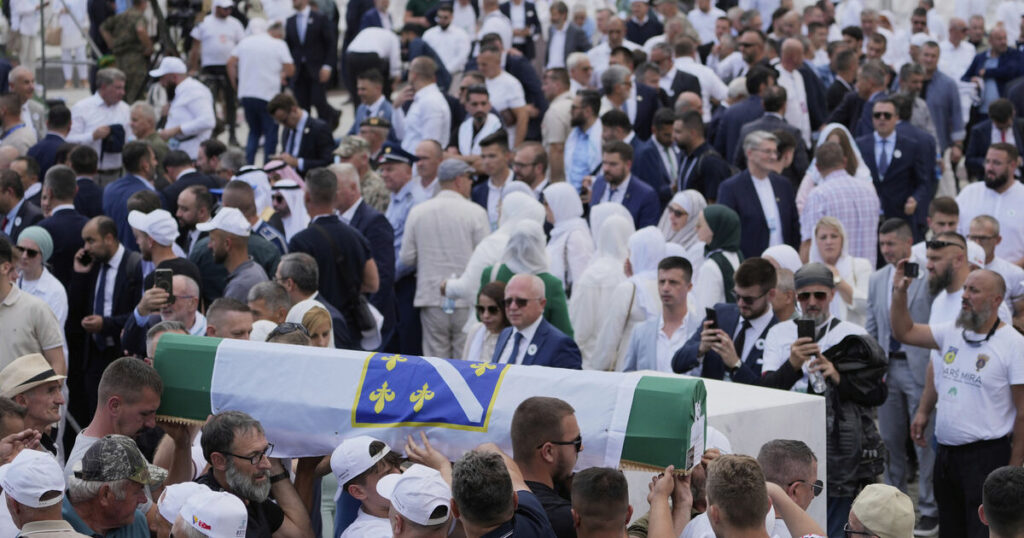Thousands have gathered in Srebrenica, Bosnia, and from around the world to commemorate the 30th anniversary of the Srebrenica massacre, where over 8,000 Bosniak Muslim men and boys were killed.
A collective funeral was held on Friday at a vast cemetery near Srebrenica for seven newly identified victims of the 1995 massacre, including two 19-year-old men. They were laid to rest alongside more than 6,000 victims already buried there.
These annual funerals are for victims whose remains continue to be unearthed from numerous mass graves surrounding the town.
Often, relatives can only bury fragments of their loved ones, as remains are typically scattered across multiple mass graves, sometimes miles apart. Mirzeta Karic, waiting to bury her father, experienced this firsthand.
“Thirty years of search and we are burying a bone,” she lamented, weeping beside her father’s coffin, draped in green cloth according to Islamic custom.
“I think it would be easier if I could bury all of him. What can I tell you, my father is one of the 50 (killed) from my entire family,” she added.
The killings began on July 11, 1995, when Bosnian Serb forces seized the eastern Bosnian enclave during the final months of the Bosnian War.
After taking control of the town, a UN-protected safe zone, Bosnian Serb soldiers separated Bosniak Muslim men and boys from their families and systematically executed them over several days.
The bodies were initially buried in mass graves around Srebrenica. Later, the graves were exhumed using bulldozers, and the remains were scattered among other burial sites in an attempt to conceal the war crimes.
The UN General Assembly adopted a resolution last year to mark the Srebrenica genocide anniversary each July 11.
Numerous international officials and dignitaries attended the commemoration ceremonies and the funeral.
Among them were European Council President Antonio Costa and Britain’s Duchess of Edinburgh, Sophie, who stated, “Our duty must be to remember all those lost so tragically and to never let these things happen again.”
Dutch Foreign Minister Caspar Veldkamp expressed feeling “humbled” given that UN troops from the Netherlands were stationed in Srebrenica when Bosnian Serbs invaded the town.
“I see to what extent commemorating Srebrenica genocide is important,” he said.
In a moving address, Munira Subasic, head of the Mothers of Srebrenica association, implored Europe and the world to “help us fight against hatred, against injustice and against killings.”
Ms. Subasic, who lost her husband and youngest son in Srebrenica, along with over 20 other relatives, urged Europe to “wake up.”
“As I stand here many mothers in Ukraine and Palestine are going through what we went through in 1995,” Ms Subasic said, referencing ongoing conflicts. “It’s the 21st century but instead of justice, fascism has woken up.”
On the eve of the anniversary, an exhibition opened displaying personal belongings of the victims, recovered from the mass graves over the years.
The Bosnian War began in 1992 when Bosnian Serbs revolted against the country’s independence from Yugoslavia, seeking to create their own state and eventually unite with Serbia.
The conflict resulted in over 100,000 deaths and millions displaced before a US-brokered peace agreement was reached in 1995.


